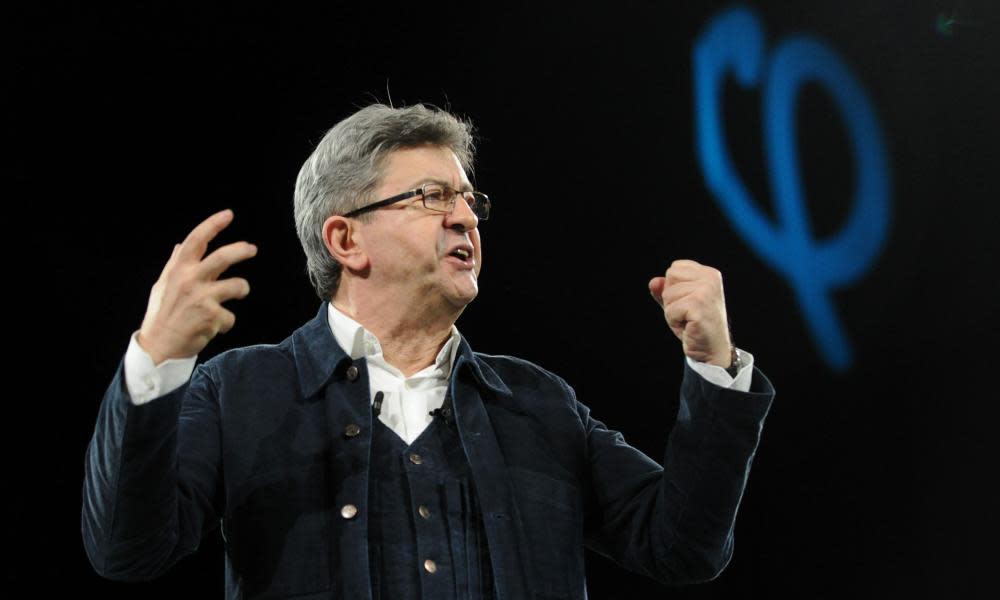Jean-Luc Mélenchon, France's hard-left rebel, targets the disenchanted

For Jean-Luc Mélenchon, France’s hard-left presidential candidate, it is a case of one down, two to go.
Opinion polls suggest the veteran political rebel, who is calling for a nonviolent “citizens’ revolution” and for the French constitution to be torn up and rewritten, has overtaken the official Socialist party candidate, Benoît Hamon.
Less than four weeks from the presidential election, Mélenchon is now stalking the rightwing Les Républicains candidate, François Fillon.
If successful, he predicts he will be in a position to launch a serious challenge to independent centrist Emmanuel Macron to reach the second round of the presidential vote and take on the far right’s Marine Le Pen, a woman he loathes so deeply he is reluctant to utter her name.
So far, so Mélenchon – but is this just a political pipe dream? Sitting on a TGV train returning from the Breton city of Rennes, where he had addressed a rally of around 10,000 people, the presidential candidate gives a withering look that suggests nothing of the sort.
“France is the most political nation in Europe and the French are great tragic actors; right now we are in a very explosive situation that is pre-revolutionary,” he told the Guardian.
“The atom is very small, but split it and it shatters far and wide. We have a society that is disintegrating and we need this citizens’ revolution, not just in France but throughout Europe. I hope France will lead the way.
“Four weeks from the election and almost half the people, 47% to be exact, still don’t know who they will vote for. It’s a sign of extreme confusion, of how extremely volatile the situation is,” he added.
Mélenchon, 63, a former stalwart of the Socialist party, which he quit in 2008 after 35 years, has no party. Instead he has a movement, la France insoumise (Unbowed France), whose members – 328,000 at the last count – he calls les insoumises (the unbowed); a 350-point manifesto called L’Avenir en commun (the common future); and a new slogan: la force du peuple (the force of the people).
His programme is not for the faint-hearted. Money – whether a lack or surfeit of it – is the root of most evil. He proposes a monthly minimum wage of €1,300 (£1,125), 100% taxation for those earning more than €33,000 a month, and the renegotiation of EU treaties to escape the yoke of “economic liberalism”.
There are measures to protect workers’ rights and “protect common property” such as air and water, and hundreds more proposals to create a France that is fairer, greener and more fraternal, in which individual desires and aspirations are yoked to the common good.
We have a society that is disintegrating and we need this citizens’ revolution, not just in France but throughout Europe
Jean-Luc Mélenchon
Mélenchon is targeting the undecided and those who are so put off by the scandal-hit presidential campaign that they may not vote at all, like Sylvie Bourasseau, a web developer who had driven three hours to attend the Rennes rally with her children, aged between 12 and 25.
“I am not convinced, but my elder son persuaded me to come to find out more,” she said. “I haven’t voted in the last few elections because I wasn’t persuaded by anyone’s project. The traditional parties don’t speak to us, it’s all blah blah, and treating the voters like idiots.”
Isabelle Parisse, 51, a hospital worker from Rennes, was also keen to hear Mélenchon speak. “For me, Macron is not leftwing, Hamon’s programme is a bit vague, which leaves Mélenchon. I think he has some very good ideas. I don’t agree with everything; some things seem a bit utopian like free healthcare, but why not? I haven’t decided completely and I’m here to listen,” she said.

Inside the hall, the audience jumps to its feet and chants “Resistance” as Mélenchon enters. He asks supporters not to chant his name or treat him like a rock star – it is not about him but the programme. Unlike other rallies whipped up by impassioned rhetoric, the audience appears to be intently listening to Mélenchon as he strolls around a small central stage, peppering his discourse with quips and jokes.
Back on the TGV, Mélenchon, who was fourth in the first round of the 2012 presidential vote with 11.1%, nods vigorously when asked if he is optimistic about his presidential chances this time around.
With Hamon struggling with damaging defections by socialist ministers, and a widespread disaffection with François Hollande, in whose government Hamon served, Mélenchon believes France is witnessing the death throes of its Socialist party. “I was a member for more than 30 years, but it’s finished,” he said.
“It’s the end of a cycle. Gone are the days in politics when everything passed through the party. The internet can now do 90% of the tasks that previously justified the existence of a party machine.”
The political journalist Bruno Jeudy says Mélenchon is surfing a new wave. “The dynamic is on his side,” Jeudy told Europe 1 radio.
“Clearly, Jean-Luc Mélenchon is not at the moment in a position to qualify for the second round … but he is reaping those who are disappointed with the left and also those sick of politics altogether.
“His position as a candidate at war with the political system is paying off.”

 Yahoo News
Yahoo News 
